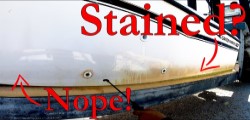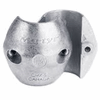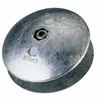WHAT TYPE OF ANODE TO USE
Not all anodes are suitable for use in every type of water. For example, if zinc or aluminum anodes are left in freshwater they will develop a layer of oxide which will stop the anode from working. On the other hand, aluminum anodes will operate effectively in brackish water whilst zinc anodes will become unreactive. If the wrong type of metal is chosen for the water type, the anode will become useless!
Important! Which type of anode do YOU need?
| Zinc | Aluminum | Magnesium |
| For use in salt water | For use in salt, brackish and fresh water | ONLY for use in fresh water |
| Not recommended for use in fresh water | Proven to last longer than zinc due to increased capacity | Not recommended for use in salt or brackish water. |
Oxidation of Metals Underwater:
Being underwater, your boat's metal is at risk of oxidation. In other words, rust and disintegration from Electrochemical Corrosion.
Almost all metals will eventually corrode and break down in the presence of an oxidant. However, we have all seen that some metals corrode faster than others. Corrosion-resistant metals are called "noble metals" and are often highly valued for these properties, such as gold, platinum, and silver. Highly active metals (ie, corrosion-susceptible) are aluminum, zinc, magnesium.
In theory, you could build a boat completely from corrosion-proof metals, but the cost and weight of a gold or platinum boat would be prohibitive and hard to float, not to mention vulnerable to theft!
The trick to stopping your valued metal from rusting is to exploit the process of Galvanic Corrosion!
Understanding Galvanic Corrosion:
When two dissimilar metals in contact are placed in an electrolyte (an electrically conductive substance, ie seawater or even fresh lake water), electrons begin to flow (just like the plates of a battery), resulting in an electrical current. This action kickstarts Galvanic Corrosion. The metal that loses electrons is called the "anode" and the metal attracting the electrons is called the "cathode". Galvanic corrosion will eventually lead to the complete and utter disintegration of the anode!
Which metal will become the anode, and which will be the cathode?
As you can imagine, in a potential galvanic corrosion situation, the metal that is highly active (ie suspectible to corrosion) will become the anode, while the noble (corrosion resistant) metal becomes the cathode.
Obviously, if you have good quality boat parts, they will be made of corrosion resistant metals (ie, stainless steel) or if they aren't corrosion resistant, they'll be at least coated with a good layer of paint! But as we have learned, virtually all metals will eventually corrode, and paint does get damaged - causing the metal underneath to become vulnerable.
Using Galvanic Corrosion to fight Electrochemical Corrosion!
As mentioned earlier, when your boat's metal is placed underwater, chemical reactions begin to occur between your metal and oxygen dissolved in the water. Even if your metal is corrosion resistant, due to Electrochemical Corrosion, the "rusting process" will eventually happen!
However, by placing a highly active metal nearby your less-active metals, this will cause galvanic corrosion to occur in the more active metal. This sacrificial active metal anode "rusts" preferentially, instead of your precious boat bits (now called the cathode).
In other words, the "rusting process" likes to oxidize whatever metal it can get its hands on. The sacrificial anode is more easily oxidized than the metal that it is protecting.
How long will the anode last?
Quite simply, anodes won't last forever - and that's the point. Ironically, anodes are usually made of materials that are more expensive than the cathode materials we are trying to protect! Of course, if your steel hull was left unpainted, your anodes would be working overtime - the large surface area would cause huge amounts of galvanic corrosion - and while the anode might prevent all that metal from rusting, it would be eaten up very quickly. If you prevent rusting from occuring in the first place by coating/painting your metal, it will have the side effect of slowing down the galvanic corrosion process - simply because there is less noble metal available for galvanic corrosion to occur.
However, if your anodes are being consumed too slowly, they will passivate, and then they don't work at all! A boat with too many anodes will have a low electrical current per anode. This leads to a slow a rate of dissolution, and therefore passivation of the anodes. Speak to a marine surveyor to determine how much anode surface area is right for your hull!











